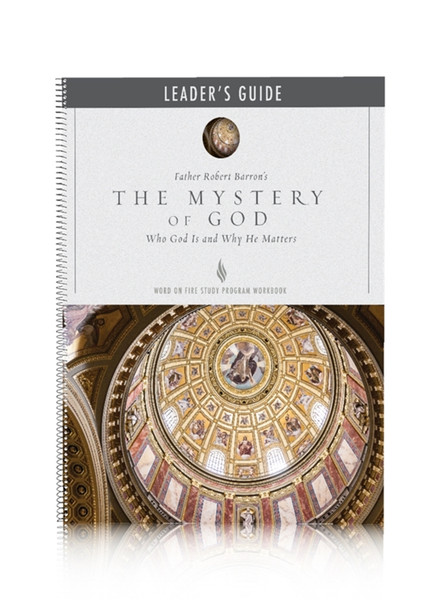Product Overview
This is the Leader Guide for the Mystery of God Study Program. It contains the Facilitator Guide, the entire Study Guide, and the Answer Key.
To view the lesson topics contained in the leader guide, please click here.
You can watch the DVD and then probe more deeply into Bishop Barron’s message by using the companion Study Guide, which is divided into sections that correspond to each part of Father's presentation. The Study Guide was written by Catholic author, Trent Horn, an apologist at Catholic Answers, compiled under the direction and approval of Bishop Barron. Trent has relevant experience in this area as one of his books is Answering Atheism: How to Make the Case for God with Logic and Charity.
Each section of the study guide provides a detailed commentary on the DVD and “Questions for Understanding" based on the DVD presentation, Scripture and the Catechism of the Catholic Church. Each section also includes “Questions for Reflection" that help you connect the material to your own life and experience.
For group study, you can present the program in seven 90-minute sessions. Each session includes DVD viewing and small group discussion of Study Guide questions. Participants read the commentary in the study guide and prepare the questions before the small group discussion. This preparation can be accomplished either before or after they view the DVD, as the Commentary in each lesson is very detailed.
LESSON 1 – ATHEISM AND WHAT WE MEAN BY "GOD"
There are lots of views about God. Some see him as a mythical fairy in the sky, others as the Supreme Being. Some consider him a threat to our freedom. But for Christians, God is not one being among many. He's not a competitor to our flourishing. God is that than which nothing greater can be thought, the strange and unique source of being itself. Before discussing anything about God we must become clear about one question: who is God?
LESSON 2 – ST. THOMAS AQUINAS AND THE PATHS TO GOD
In the thirteenth century, St. Thomas Aquinas composed his famous five paths to God. His proofs don't depend on the Bible or divine revelation. They simply start from the world around us—trees, birds, buildings, and even ourselves. Thomas noticed that none of these things have to exist. But if that's the case, there must be some cause behind them, something grounding their existence. For Thomas and all Christians since, we know this source of all being by its ancient name—God.
LESSON 3 – THE DIVINE ATTRIBUTES
Once we understand who God is, we naturally wonder, "What is he like? How does he act?" We can never fully answer those questions. Yet we can know that God is self-sufficient—he doesn't need the world but creates it out of love. God is omniscient, knowing all things. God is omnipresent, everywhere in existence. Through these attributes we discover a God who presses upon the world, always and everywhere, not aggressively but only with love.
LESSON 4 – PROVIDENCE AND THE PROBLEM OF EVIL
Perhaps the most difficult question in theology is this: Why does God allow evil? If God is all-good and all-powerful, then why are our lives marked with pain and suffering? These are not abstract questions. They go right to the heart of our experience. We have each wrestled with misery, wondering when God would intervene. As with Job, God does not give us answers. He instead offers a person: the crucified Jesus, through whom God enters our suffering and makes it his own.
LESSON 5 – EXPLORING THE TRINITY
The most important event in human history took place when God, infinite and incomprehensible, became a finite and familiar man, Jesus Christ. While some people reduce Jesus to a wise teacher, the testimony of scripture and the early Church makes it clear that Jesus of Nazareth was, and is, God incarnate. He's the Second Person of the Trinity. And by his sacrificial death and glorious resurrection, we too can enter into Trinitarian life.
LESSON 6 – THE GOD WHO IS LOVE
The book of Genesis reveals that we are made in the image and likeness of God. What does this mean? For St. Augustine it affirmed that our own traits—our minds, our self-knowledge, our self-love–can tell us something about God as a Trinity. What is Christianity finally about? What is the deepest meaning of being and all reality? The Christian answer is this: God is love, a play of Father, Son, and Holy Spirit.





